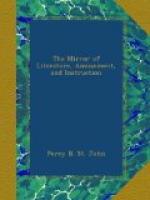Thou wert the rainbow of my dreams,
To whom the eyes of Hope might
turn,
And bid her sacred flame arise
Like incense from the festal
urn;
But as the thunder clouds conspire
To wreck the lovely summer
sky,
So Death destroyed the liquid fire
Which shone so brightly in
thine eye!
The cypress weeps upon thy tomb:
But when the stars unfold
their leaves
Amid their bow’rs of purple gloom,
More fervently my spirit grieves;
And as the rainbow sheds its light
In fairy hues upon the sea,
So this cold world appears more bright
When pensive Memory thinks
of thee!
G.R.C.
* * * * *
LORD BYRON.
Translation of a letter written by Lord Byron, in Greek and Italian, to the Pacha of Patras.[5]
Highness.—A vessel containing several of my friends and servants, having been captured and conducted by a Turkish frigate to your fortresses, was released by your highness’ command. I return you thanks, not for releasing a vessel bearing a neutral flag, and which being under British protection, no one had a right to detain; but for having treated my friends with great courtesy while at your disposal. Hoping it may not be unacceptable to your highness, I have requested the Greek Governor of this place to grant me four Turkish prisoners; which has been readily conceded. I send them therefore, free, to your highness, in order to return your courtesy as far as is in my power. They are sent without conditions, but if the affair is worthy of your remembrance, I would merely beseech your highness to treat with humanity such Greeks as are in your power, or may chance to fall into the hands of the Musselmen, since the horrors of war are sufficient in themselves, without adding on either side cruelties in cold blood.
I have the honour to be, &c.
Noel Byron, Peer of England.
Missolonghi, Jan. 23, 1824.
[5] From a correspondent (E.),
who believes that no English version of
this
letter has hitherto appeared in print.
* * * * *
WHEN WILT THOU RETURN?
When wilt thou return?
The silver clouds are closing
Like billows o’er the fairy path
Of sunset there reposing;
The sapphire fields of heaven,
With its golden splendour
burn,
And purple is the mountain peak,—
But when wilt thou return?
When wilt thou return?
The woods are bright with
summer,
And the violet’s bower is grac’d
With the rose—a
queenly comer;
The stars, that in the air
Like ethereal spirits burn,
Seem watching for thy steps,—
Oh I when wilt thou return?
When wilt thou return?
The sheathless sword is idle,
And each warrior from his steed
Has thrown aside the bridle.
Hark!—’tis the trumpet’s
call!
With hope our bosoms burn;
Its echo wakes the distant hills,
Announcing thy return!




